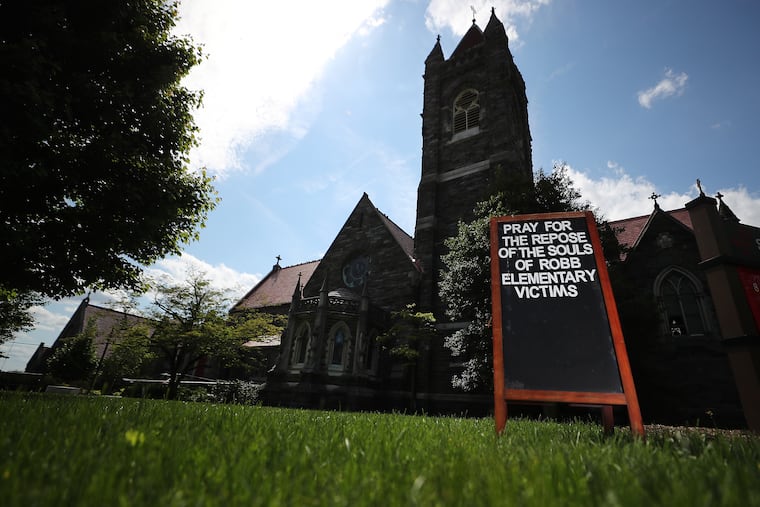Sharing grief can help us heal after mass shootings
Faith leaders are bringing people together to share pain and take action after Uvalde

On the church grounds of St. Martin-in-the-Fields in Chestnut Hill, a sign prominently displays encouraging messages of support and calls for prayer during holidays and major events throughout the year. This past week, it called for prayers to the victims of Robb Elementary School.
On Tuesday, a gunman entered the elementary school and killed 21 people — 19 of them students — in Uvalde, Texas. Two weeks before in Buffalo, a gunman shot and killed 10 people — most of whom were Black — in a racist massacre.
Many across the Philadelphia region — and the nation — are once again grappling in the aftermath of violent mass shootings that claim dozens of lives. In Philadelphia, over 300 people have died and nearly 700 people have been shot in 2022 because of the gun violence crisis in the city. For many, the news of bystanders being shot and killed while going about their daily lives is reaching a tipping point, said Barbara Thomson, the leader of the vestry at Church of St. Martin-in-the-Fields.
“It’s very hard for people to even talk about their grief right now,” said Thomson. “When we don’t know what to do, we come together as a community.”
Faith organizations and congregations across the Philly region are finding ways to navigate the pain of violence. St. Patrick’s Church in Rittenhouse is holding vigils everyday from May 25 through June 26 for people who have lost their lives to gun violence, in the war in Ukraine, and other tragic events.
The Rev. Mark Tyler of Mother Bethel A.M.E. Church shared with his congregation on Sunday that people are “getting sick” of watching people continue to die in mass shootings while nothing is done to change the status quo. According to Tyler, healing is found when feelings are shared and heard.
Finding a safe place for vulnerability
Clara Whaley-Perkins, a trauma specialist and founder of Life After Trauma Organization (LATO), says opening up to community about trauma can start the healing process. When someone is feeling grief or intense emotions, it’s crucial to turn to community and acknowledge the pain.
“A grieving process allows us to heal. When we deny that process, that’s when the numbness sets in. Then beyond that we start feeling symptoms of anxiety, and beyond that — depression,” said Whaley-Perkins. “So it’s really important for people who are vulnerable or have previous traumas that you don’t wait to see if it’s going to go away. Healing is extraordinarily important.”
According to Whaley-Perkins, a community should be a group of people that provide safety, can be trusted, and where one can be vulnerable with their feelings. For many in Philadelphia, where they practice their faith is also where communities resides.
Balancing healing and collective action
Rabbi Yehuda Shemtov, the executive director of Lubavitch of Bucks County, finds these moments of communal grief are a good time for dialogue with ourselves and community. Asking, “What is causing people to do this?” and having conversations among community to figure out solutions.
“Unless we change fundamentally how we educate our society, unfortunately people will still find a way to do these things,” said Shemtov. “We are all different — but we were all created by God with a purpose. Everybody has to start where they can start. If you’re not in the position to make national or local change, we can all change how we treat our neighbors, families, and people at work. That’s what we can all do.”
According to Shemtov, having a purpose and cultivating purpose among others in the community brings about positive change directly on a small-scale. Before diving into the political and legal ramifications of gun violence, Shemtov advises to ask what growth can be had from reflecting.
“How do we bring purpose into our daily conversations, our daily actions?” said Shemtov. “Instead of this event becoming another divisive point between people, allow it to be another source of respect and mutual understanding.”
As the country reckons with how to move forward, interfaith leaders in Philadelphia look to balance healing with collective action. To Chad Dion Lassiter, who is a national race relations expert and executive director of Pennsylvania Human Relations Commission, taking care of oneself, of one’s community, and finding the motivation to take action are made possible by taking the healing process seriously.
“As you’re taking care of yourself and pouring into others, you want to make sure that you have a support system that pours into you simultaneously,” said Lassiter, who is also a person of faith. “Trying to build the beloved community from the ground up, which is micro, and then from a macro level, holding politicians and legislators accountable.”